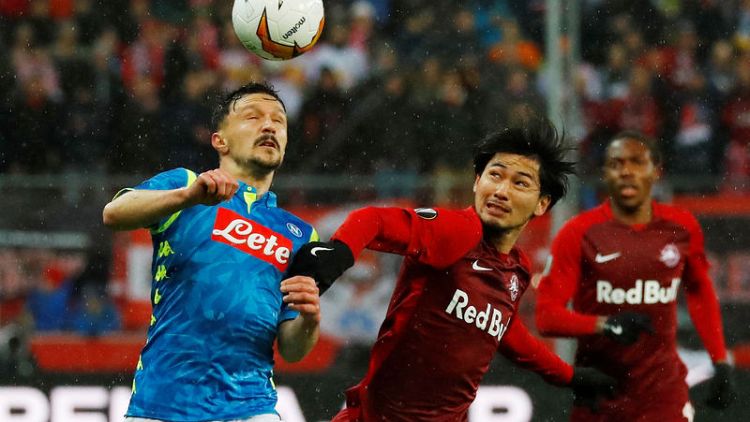By Brian Homewood
ZURICH (Reuters) - RB Salzburg have dominated the Austrian Bundesliga for more than 10 years but something unsuual happened this season.
They were nine points clear at the top and cruising towards yet another title when their lead was slashed to four points overnight, reigniting the title race. How did it happen?
The league had introduced a new format, part of which involved halving teams' points totals at the two-thirds stage in a bid to make the title race more interesting.
Since receiving the financial backing of energy drinks manufacturer Red Bull in 2005, Salzburg have won the title 10 times, including the last six in a row.
Their success has had a snowball effect as the resulting participation in European competition has brought in extra revenue, further increasing the financial gap over rivals such as Rapid Vienna, Austria Vienna and Sturm Graz.
Austria has not been alone in having a predictable -- some would say boring -- championship virtually every season.
All over Europe, many domestic football leagues, big and small, have turned into one-horse races, with the same team winning repeatedly, often by embarrassing margins.
In Italy, Juventus have won the last eight Serie A titles, while Bayern Munich have lifted the Bundesliga trophy seven times in a row and Qatari-owned Paris St Germain have claimed the Ligue 1 crown six times in the last seven seasons.
In fact, the defending champions retained their titles in all of Europe's top five leagues this season, including Barcelona and Manchester City, with Juve and PSG each wrapping up the domestic championship with five games left.
Former Bayern captain Philipp Lahm was among those who questioned whether the Bavarians' dominance of the Bundesliga was a good thing.
"In German football, we have to be clear about whether we like that -- and what decisions are needed if we do not like it," he said. "We need to discuss more about the future of football, and the Bundesliga definitely needs more competition."
Far from the glamour of the big leagues, it is a similar story.
BATE Borisov have won the last 13 titles in Belarus, Celtic the last eight in Scotland, Dinamo Zagreb -- currently 23 points clear of Rijeka with one game left -- 13 of the last 14 in Croatia and Sheriff Tiraspol 17 out of 19 in Moldova.
EUROPEAN RICHES
Some observers blame the riches from European competition for distorting leagues, although UEFA has repeatedly rejected this, saying the dominance of certain clubs has always been a feature of domestic football and other factors are at play.
However, football finance expert Rob Wilson of Sheffield Hallam University said: "We have a system in Europe that now favours larger clubs and protects their income streams."
He suggested that soccer needed to follow the example of American team sports and distribute prize money more equally.
"What I mean here is that league prize money is awarded differently with lower placed teams earning a larger share than the winners," he said. "This would redress the revenue balance and therefore competitive balance."
Wilson added that this would not be straightforward and could lead to a situation where teams lose games near the end of the season to drop down a place or two.
Another problem is the predatory transfer policies of some big clubs, who pick off the top players from other clubs.
"This strengthens their own position, of course, but also significantly weakens those (smaller) teams," said Wilson.
In the meantime, some leagues, such as Austria, have opted for creative measures, moving away from the traditional league format in an attempt to prolong the contest.
The Czech league switched to a 'split format' this season, meaning that, according to UEFA, 18 of Europe's 54 leagues have abandoned the traditional system where teams play each other twice.
In doing so, they are moving towards the systems used in South America where for years bafflingly complex formats have been invented to artificially keep the contest alive as long as possible and, sometimes, prevent big clubs being relegated.
In Austria's case, the 12 teams play each other twice in the regular season in the conventional style but are then divided into two mini-leagues -- the top six to battle for the title and Europa League places and the bottom six to avoid relegation.
Points totals are halved and rounded down, if necessary, so that Salzburg's 55 points became 27.
Not surprisingly, reaction was divided between Salzburg, whose coach Marco Rose described the new system as "unusual", and most other clubs, who were in favour.
LASK Linz coach Oliver Glasner, however, said that no amount of tinkering with the format could stop Salzburg's dominance.
"Because of their possibilities, which they use very well, there is no way around them," he said before the start of the season.
Glasner was proved right. Despite losing half their points, Salzburg kept on winning and clinched the title with three matches to spare. They won the Austrian Cup for good measure.
(Writing by Brian Homewood; Editing by Ken Ferris)
